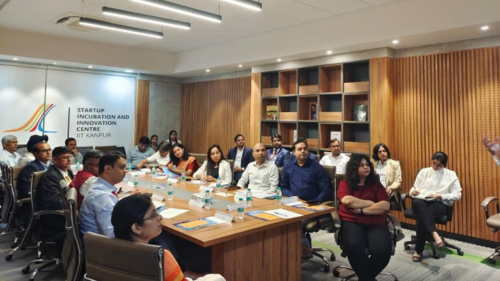Information and Media Outreach Cell
IIT Kanpur


Tech For Good: Solving Problems Through Technology Interventions - roundtable discussion organized by SIIC
12 Jul, 2023 | IITK News
The Startup Incubation and Innovation Centre (SIIC) at IIT Kanpur showcased its dedication to Corporate Social Responsibility (CSR) by hosting a dynamic roundtable discussion titled "Tech For Good: Solving Problems Through Technology Interventions” on June 16th, 2023, at the Noida Outreach Centre of IIT Kanpur.
Prof. Ankush Sharma, Professor-in-Charge, SIIC, IIT Kanpur, gave a welcome address and emphasized the need for collective action to harness technology's positive potential in addressing economic, social, and environmental challenges. He highlighted the importance of seizing the opportunity to shape a brighter world for future generations and that by joining forces, we can become catalysts for transformative societal change. He added that we must collaborate towards a future where technology serves as a powerful tool for creating a positive impact.
In his speech, Dr. Nikhil Agarwal, CEO of SIIC & AIIDE-CoE, IIT Kanpur, emphasized technology's revolutionary impact on society and positioned startups as the driving force behind this transformation. He highlighted their potential to effectively use technology in solving significant societal problems through imaginative thinking and an entrepreneurial spirit.
The primary objective of the “Tech For Good: Solving Problems Through Technology Interventions" discussion was to cultivate a collaborative atmosphere, uniting industry leaders, experts, researchers, entrepreneurs, and technology enthusiasts. The central focus was on technology's profound potential to tackle societal challenges. The event provided a unique opportunity for attendees to engage in stimulating discussions, observe practical applications of innovative projects, and learn from accomplished individuals in the field. By emphasizing the positive influence of technology, participants gained valuable insights and actively contributed to leveraging technology for societal improvement.
The event put emphasis on the significance of CSR funds in nurturing innovation and cultivating a conducive environment for start-ups. Start-ups frequently encounter difficulties in securing funding, and corporate entities have the potential to greatly assist by channeling CSR funds towards supporting incubation platforms. By utilizing these funds, incubators are empowered to offer initial-stage financial assistance, develop collaborative workspaces, engage knowledgeable mentors, and establish research and development hubs. This, in turn, facilitates start-ups in addressing economic, social, and environmental issues and finding sustainable solutions.
Implementing Gandhi's Philosophy of Trusteeship and the Triple-Bottom-Line Theory (Three dimensions i.e. Economic, Social, and Environmental) at the CSR roundtable event aimed to foster sustainable business practices. These principles help young entrepreneurs attract grants and funds by showcasing their
commitment to addressing social and environmental challenges. By prioritizing sustainability alongside financial returns, startups can enhance their chances of securing funds and making a positive impact on society. Moreover, this event recognizes the significance of philanthropic and ethical responsibilities in corporate citizenship, and the crucial role startups play in addressing societal needs in today's globalized era.
Today, business incubators are widely recognized as successful facilitators for young entrepreneurial companies, supporting startup growth. They have become integral to value creation in the global economy. The Government of India, through the Ministry of Science and Technology, encourages the establishment of Technology Business Incubators (TBIs) to foster innovation in the country. Under Section 135 of the Companies Act, 2013, eligible companies are required to allocate at least 2% of their average net profits from the preceding three financial years towards Corporate Social Responsibility (CSR) activities listed in Schedule VII of the Act. Recent provisions allow companies to contribute their CSR funds to approved TBIs and registered not-for-profit entities supporting startups in specific areas.
The discussion emphasized that corporates have been contributing to existing incubators as part of their mandatory CSR spend. However, assessing the impact of individual contributions is challenging due to fund pooling by TBIs. To overcome this, corporates were advised to specify the utilization of their CSR funds for better assessment.
The stakeholders emphasized the importance of incorporating indicators such as startup creation and graduation, startup survival rates, and job generation for assessing the impact of both corporates and TBIs. However, the diverse and intricate nature of the incubator ecosystem pose certain challenges in formulating an impact assessment framework. A combination of qualitative and quantitative indicators is necessary to address this. On the other hand, synergistic partnership between established corporations and startups is helpful, as startups bring invaluable expertise in industry trends, cutting-edge technologies, and innovation, igniting innovation within corporations and strengthening their competitive edge. Collaboration with startups enables corporations to explore new markets, form strategic alliances, and expand their influence in the business ecosystem.
During the discussion, Mr. Piyush Mishra, COO and CFO, SIIC, IIT Kanpur, highlighted the power of synergy and the boundless potential that technology holds. He said that by collaborating and pooling our resources, we have the opportunity to foster innovation, delve into sustainable solutions, and make a substantial and enduring difference in shaping our shared future.
Prof. Amitabha Bandopadhyay, Co-Professor-in-Charge, SIIC IIT Kanpur, summarized the event outcomes, emphasizing collaboration and innovative approaches in leveraging technology for societal betterment. He praised the discussion for highlighting technology's pivotal role in addressing critical challenges and acknowledged CSR's support for startups. Ethical responsibilities, sustainable practices, and corporate-startup collaboration were emphasized. He also deemed incorporating qualitative and quantitative indicators for impact assessment as important, and commended SIIC IIT Kanpur's efforts in fostering innovation and contributing to India's startup ambitions.




